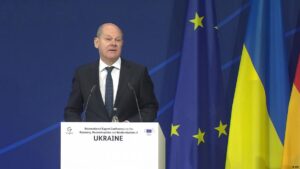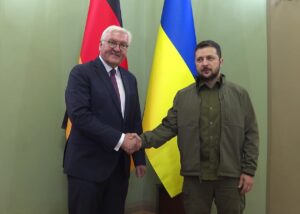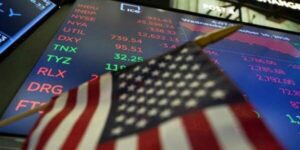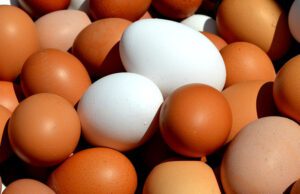
Germany reaffirms its readiness to support Ukraine for as long as necessary, and is ready to hold an annual conference on the reconstruction of the country in 2024, Chancellor Olaf Scholz said.
“Our goal is a peaceful Ukraine that will live in prosperity,” he said at the conclusion of the International Expert Conference on the Reconstruction of Ukraine in Berlin on Tuesday.
Scholz recalled that the URC was hosted by Swiss Lugano in 2022 (and Lithuanian Vilnius in 2021), and next year it will be held in the UK.
The Prime Minister of Japan, who will take over the G7 presidency next year, Fumio Kishida, in his video address to the conference in Berlin, stressed that Ukraine will remain in the spotlight, and Japan will make efforts to set the framework for a transparent and fair process of rebuilding the country based on desires. and aspirations of its people.
Also, the President of this country, Joko Widodo, announced the important position of Ukraine on the agenda of the upcoming G20 summit in Indonesia in November. According to him, the highest priority is diplomacy for the sake of peace and the end of the war.
The head of Indonesia called for a constructive dialogue for the sake of peace at the upcoming summit, including the parties “standing on different sides”, at the same time recalling the military assistance allocated to Ukraine and the commitments made by Jakarta to restore Ukrainian hospitals.

Presidents of Ukraine and Germany Volodymyr Zelensky and Frank-Walter Steinmeier approved a joint statement in which, among other things, they agreed on patronage over ties between cities and communities in Germany and Ukraine.”
“Today, for the first time in the history of our bilateral relations, we approved a joint statement by the presidents. Among other things, it establishes the personal patronage of President Steinmeier over the process of restoring the Chernihiv region. We agreed to work together at the local level, which is especially important in the context of our decentralization. The Ukrainian-German municipal partnership network will receive presidential patronage,” Zelensky said after meeting with the German president on Tuesday in Kyiv.
He also called Germany’s contribution to Ukraine’s movement towards peace and the restoration of our territorial integrity “weighty and significant.”
“I thanked Germany for providing the modern IRIS-T air defense system. She showed herself very well in protecting our sky. This is a priority, we all feel it. I hope that in the near future we can get a few more relevant systems,” Zelensky said.
“We discussed the whole range of threats – the continuation of missile terror, the involvement of Russia in accomplices of Iran and the next manifestations of Russian nuclear blackmail. We regard these and similar Russian threats in the same way as Germany,” Zelensky stressed.

Quotes of futures for US stock indices are falling during trading on Tuesday.
The S&P 500 rose in four of the last six sessions and ended Monday at its highest level in more than a month. According to analysts, this may lead to some downward correction of the market.
In addition, in the absence of significant statistics, investors evaluate the quarterly reports of companies.
3M Co. stock quotes. (SPB: MMM) are down 3.2%. The company, which produces more than 50,000 items of various goods, increased its net profit in the third quarter by 2.7 times, but reduced revenue more than analysts expected. In addition, she worsened the annual forecast.
Raytheon Technologies (SPB: RTX) in July-September reduced its net income by 1%, the adjusted figure was higher than expected, but revenue fell short of experts’ expectations. Solutions provider for the aerospace and defense industries fell 0.4%.
Warner Bros stock price Discovery (SPB: DISCA) is down 0.2%. The media company, created last year by merging AT&T’s media arm WarnerMedia with Discovery Inc., is set to restructure operations to cut costs. The cost of this until the end of 2024 is expected to be about $4.3 billion.
Tesla (SPB: TSLA) is down 0.8%, Boeing Co. (SPB: BA) – by 0.3%, Salesforce Inc. (SPB: CRM) – by 0.2%, Apple Inc. (SPB: AAPL) – by 0.25%, Chevron Corp. (SPB: CVX) – by 0.8%.
Meanwhile, General Motors (SPB:GM) is up 3.3%. The largest American automaker increased revenue in July-September by 56%, to a record.
Shares of Halliburton Co. (SPB: HAL) rise in price by 1%. The oilfield service company increased its net profit in the third quarter by 2.3 times, revenue – by 1.4 times, both figures exceeding forecasts.
Coca Cola Co. (SPB: KO) increased its net income by 14% last quarter and raised its forecast for the current year. The price of securities of the world’s largest producer of soft drinks rises by 2.5%.
General Electric Co. (SPB: GE) in July-September received an adjusted profit worse than experts’ expectations, revenue – better. The value of the company is growing by 1.9%.
The world’s largest express delivery service, United Parcel Service (SPB: UPS), posted lower-than-expected revenue in the third quarter, but adjusted earnings and its guidance for the full year were more optimistic than expected. UPS shares rose 2.7%.
Quotations of December futures for the Standard & Poor’s 500 index by 15:10 qoq decreased by 0.47% and amounted to 3791.5 points, for the Dow Jones index – by 0.6%, to 31355 points. The price of contracts for December on the Nasdaq 100 index by this time fell by 0.24% – to 11451.5 points.

Agro-industrial group of companies “Ovostar Union”, one of the leading producers of eggs and egg products in Ukraine, in January-September 2022 reduced the production of chicken eggs in shell by 5.1% compared to the same period in 2021 – 1.19 billion eggs. , while their sales decreased by 2.4% – to 824 million units.
According to the report of the group of companies published on the website of the Warsaw Stock Exchange on Tuesday, Ovostar increased the export of eggs by 6.7% in the first nine months of this year, to 223 million eggs, as a result of which the share of foreign deliveries in the company’s sales increased by 2 percentage points. P. – up to 27% from 25%.
“During the third quarter of 2022, the group’s companies continued to operate under the pressure of risks and uncertainties caused by the ongoing Russian military invasion of Ukraine. Given the specifics of the current operating environment in Ukraine, management assesses the group’s operational results as satisfactory,” said Borys Belikov, CEO of the company. the words of which are given in the message of the holding.
Also, Ovostar processed 339 million eggs in January-September 2022, which is 10% less than its figures for the same period last year.
The number of birds “Ovostara Union” as of September 30, 2022 amounted to 6.84 million heads (14.2% less than on the same date a year earlier), including laying hens – 5.75 million heads (- 13.3%.
Sales of dry egg products of Ovostar for the three quarters of this year decreased by 55.9% compared to January-September 2021 – to 1.16 thousand tons, and the share of their exports in the total sales structure did not change, remaining at the level of 68% .
At the same time, sales of liquid egg products decreased by 26.4% – to 7.53 thousand tons, the share of their exports amounted to 41% against 28% in the same nine months of 2021.
The average selling price of chicken eggs in shell in the specified reporting period of the current year remained at the last year’s level – $0.076/piece, dry egg products increased by 80%, up to $8.63/kg, liquid egg products – by 10%, up to 1 83 $/kg.
The Ovostar Union group of companies is a vertically integrated public holding company, one of the leading producers of chicken eggs and egg products in Europe. The manufacturer has been a certified exporter to EU countries since 2015.
The holding company of the group is Ovostar Union N.V. in mid-June 2011, it held an IPO of 25% of the shares on the Warsaw Stock Exchange and raised $33.2 million. The majority stake in the company is owned by Prime One Capital Limited, which is controlled by its CEO Boris Belikov and chairman of the board of directors Vitaly Veresenko.
Ovostar received $1.65 million in net profit in 2021, which is 38% less compared to 2020. Its EBITDA fell 29% to $5.7 million, while revenue increased 35% to $133.3 million.

Traders are evaluating both signals of weakening global economic growth and the prospects for a reduction in fuel supply on the world market. In particular, investors are waiting for details of the US-promoted plan to introduce a price ceiling for Russian oil against the backdrop of a full-scale war unleashed by the Russian Federation against Ukraine, writes Bloomberg.
The price of December futures for Brent on London’s ICE Futures is $93.25 per barrel by 8:15 ET on Tuesday, which is $0.01 (0.01%) lower than the closing price of the previous session. As a result of trading on Monday, these contracts fell by $0.24 (0.3%) to $93.26 per barrel.
The price of futures for WTI oil for December in the electronic trading of the New York Mercantile Exchange (NYMEX) rose by this time by $0.03 (0.04%), to $84.61 per barrel. By the close of previous trading, the value of these contracts fell by $0.47 (0.6%) to $84.58 per barrel.
Published the day before, statistical data from China, which is the world’s largest oil importer, were mixed. The growth of the country’s GDP in the third quarter exceeded forecasts, while the September increase in retail sales was the lowest in 4 months, and the increase in imports fell short of experts’ expectations.
In addition, reports of the introduction of quarantine restrictions in the major Chinese city of Guangzhou dampened risk appetite in global markets, including oil.
“It is possible that the risks of a recession, as well as a drop in demand in China, are exaggerated and already priced into the market,” said Steven Innes, managing partner of SPI Asset Management, quoted by Bloomberg. in response to the military aggression of the Russian Federation against Ukraine – IF) on the supply of Russian oil to the European Union in December – these are the main factors that will serve as catalysts for rising prices and lead to their rise to $100 per barrel by the end of the year.

Stock indices of the Asia-Pacific region rise in trading on Tuesday, following the positive dynamics of the US stock market.
Chinese indices are also growing quite steadily after a sharp decline the day before.
The country’s authorities, including the State Reform Development Committee of the People’s Republic of China, issued a notice asking local authorities to make more favorable conditions for the entry of TNC executives, technical personnel, specialists and their families into China. This measure mainly serves to attract foreign investment to the country and is a signal to loosen the tough policies against the coronavirus.
China’s Shanghai Composite rose 0.6% by 8:15 am CST, as did Hong Kong’s Hang Seng.
The leaders of growth in quotations on the Hong Kong Stock Exchange are the shares of the owner of a chain of Chinese restaurants Haidilao International Holding Ltd. (+6%), online retailer JD.com Inc. (+4.7%) and electronics manufacturer Xiaomi Corp. (+4.6%).
PC maker Lenovo Group Ltd. rise in price by 4.5%, retailer Alibaba Group Holding Ltd. – by 4.4%, sports equipment manufacturer Anta Sports Products Ltd. – by 3% and video game developer Netease Inc. – by 3.2%.
The value of the Japanese Nikkei 225 index increased by 1.1% by 8:20 am KSK.
The shares of Nidec Corp, a manufacturer of electric motors, are rising most significantly. (+4.4%). The company posted a 37% increase in net income in the second financial quarter, driven by strong performance in the automotive equipment and parts segment.
In Japan, the papers of the transport and logistics company Kawasaki Kisen Kaisha Ltd are also rising in price. (+4.1%) and investment SoftBank Group Corp. (+3.6%).
The South Korean index Kospi added 0.1% by 8:25 am KSK.
Quotes of securities of one of the world’s largest manufacturers of chips and electronics Samsung Electronics Co. grow by 1%, the cost of automaker Kia Corp. increases by 0.5%.
The Australian S&P/ASX 200 gained 0.3%.
On the stock exchange in Sydney, the most expensive stocks of credit Credit Corp. group ltd. (+7.9%), gold miner St. Barbara Ltd. (+5.3%) and media company Nine Entertainment Co. holdings ltd. (+5%).
The capitalization of the world’s largest mining companies BHP and Rio Tinto fell by 1.3% and 1.4%, respectively.